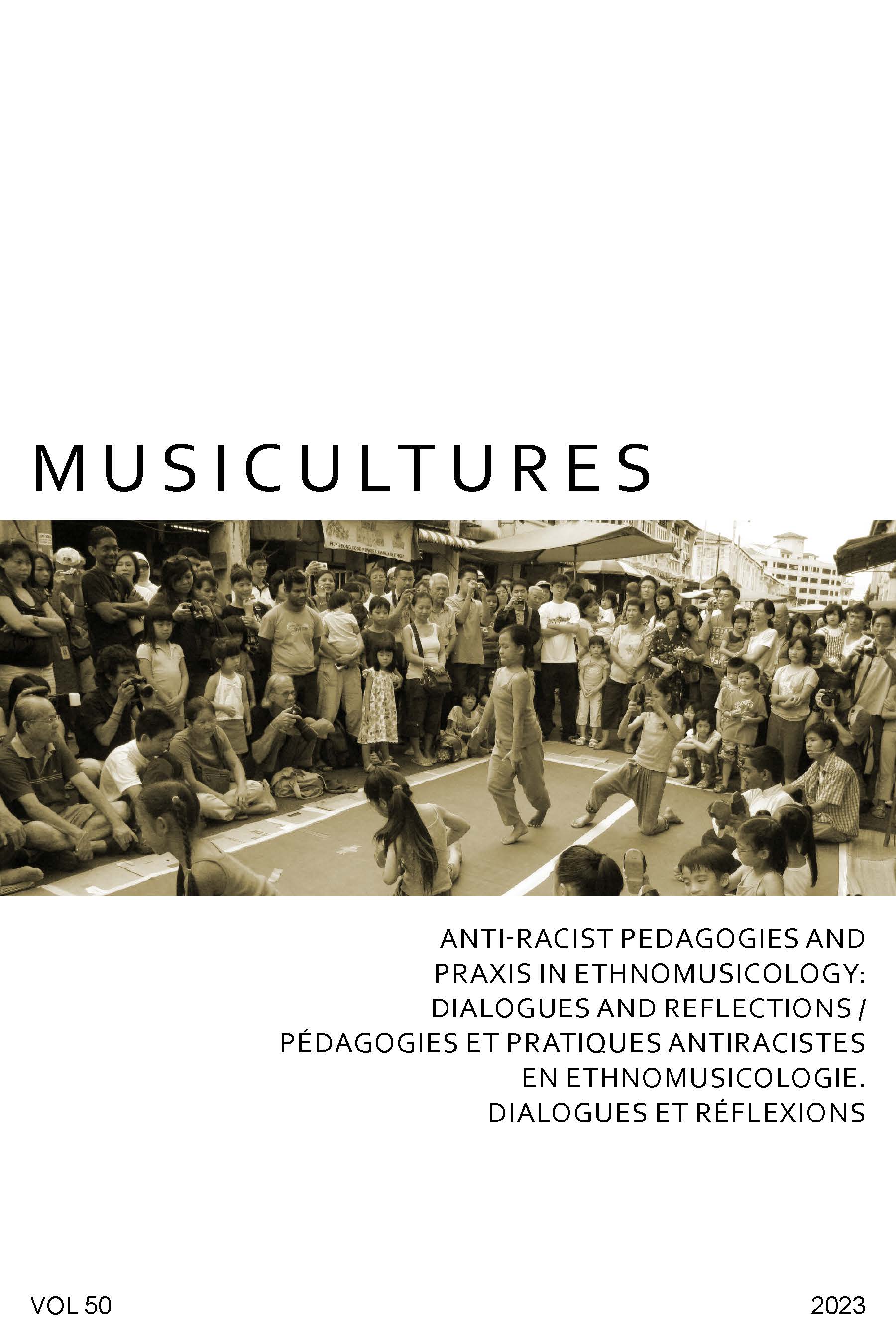Références
Anderson, William M., and Patricia Shehan Campbell. 2011. Multicultural Perspectives in Music Education. 3rd ed. Lanham, MD: R and L Education.
Arya, Divya D. 2015. North Indian Classical Vocal Music for the Classroom. Music Educators Journal 102 (1): 83–89.
Banks, James A. 1995. Multicultural Education and Curriculum Transformation. The Journal of Negro Education 64 (4): 390–400.
Blankenship, Carole. 2021. Diversity and Inclusion: Actions Sing Louder than Words. Journal of Singing 78 (1): 1–2.
Davis, Andrew, and Howard Pollack. 2007. Rotational Form in the Opening Scene of Gershwin’s Porgy and Bess. Journal of the American Musicological Society 60 (2): 373–414.
Gandhi, Pratik. 2020. Composer Representation in Canadian Wind Band Festival Lists. Canadian Winds 19 (1): 25–29.
Patinka, Paul. 2021. Representations in Vocal Repertoire. Journal of Singing 78 (2): 161–70.
Memorial University of Newfoundland. 2021–2022. 13.1 Applied Music Courses. University Calendar 2021–2022. https://www.mun.ca/university-calendar/media/production/memorial/administrative/university-calendar/medialibrary/2021-22%20University%20Calendar%20(COMPLETE)b-public.pdf (accessed November 7, 2023).
National Association of Teachers of Singing. 2023. NATS I.D.E.A Toolkit.
Weber, William. 2001. The History of Musical Canon. In Rethinking Music, 337–55. Ed. Nicholas Cook and Mark Everist. Oxford: Oxford University Press.
Ébauche de règlement relatif aux droits des auteurs d’articles publiés dans MUSICultures
- L’auteur conserve ses droits sur son travail.
- L’auteur cède au propriétaire de la revue (The Canadian Society for Traditional Music / La Société canadienne pour les traditions musicales) l’exclusivité de la publication de son œuvre.
- L’auteur peut publier une version pré- ou post- publication de son travail (voir les définitions ci-dessous) sur un site Internet personnel jusqu’à douze mois après sa publication dans MUSICultures. Au bout de douze mois, la version pré-publication doit être remplacée par la version publiée.
- L’auteur a la possibilité de déposer le PDF de son travail publié sur un répertoire en ligne à but non lucratif douze mois après que son travail ait été publié dans MUSICultures, ou par la suite à n’importe quel moment à sa convenance.
- Un tel dépôt doit comporter un lien renvoyant à son travail sur le site Internet de MUSICultures, soit https://journals.lib.unb.ca/index.php/MC/article/view/19996
Une pré-publication est un travail en cours – une contribution non encore acceptée, voire encore non soumise, à MUSICultures.
Une post-publication est la version d’une contribution après évaluation par les pairs et acceptation par MUSICultures, les corrections y ayant été apportées.
La version publiée est le fichier PDF de la contribution telle qu’elle apparaît dans MUSICultures.
Veuillez noter que academia.edu et ResearchGate.com sont tous deux des répertoires à but lucratif ; les auteurs ne peuvent y déposer les versions PDF publiées de leur travail avant la fin de la période d’interdiction imposée par la revue.
Pour les autorisations de réimprimer ou de traduire des textes de MUSICultures, veuillez contacter Heather Sparling, rédactrice en chef de MUSICultures (heather_sparling@cbu.ca).

